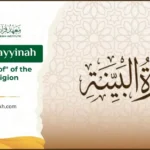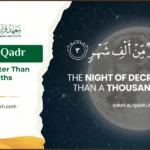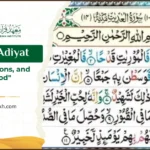Introduction: The Painful Insult and the Divine Comfort
Imagine the immense personal grief. The Prophet Muhammad (ﷺ) had just lost his beloved son. In the cruel, tribal culture of Makkah, a man’s legacy was his sons. Seeing the Prophet (ﷺ) in this state of loss, his enemies—men like Al-Aas ibn Wa’il—began to mock him publicly.
They called him “Abtar“—a deeply painful insult meaning “the one who is cut off,” like an animal with its tail severed. They meant his legacy was dead, his name would be forgotten, and his message would die with him.
It was in this moment of profound personal pain and public humiliation that Allah did not just send comfort. He sent a “declaration of honor” in the shortest, most powerful Surah of the Quran: Surah Al-Kawthar (The Abundance).
This (Meccan) Surah, though only three verses, is a divine response that turns the insult on its head and reveals an eternal truth about what real “abundance” and true “legacy” mean.
Listen to Surah Al-Kawthar: Recitation by Sheikh Mishary Rashid Alafasy
Listen to this beautiful recitation to perfect your pronunciation and reflect on the meanings before reading the explanation.
The Anatomy of Divine Honor: Understanding the 3 Verses
This Surah is a complete narrative of a gift, the required gratitude, and a final prophecy.
1. Innaa a’taina kal kauthar (Indeed, We have granted you, Al-Kawthar.)
- The Contemplation (The Gift): Allah’s response to the claim of being “cut off” is to state that He has given the Prophet (ﷺ) the exact opposite: “Al-Kawthar,” or “Good in Abundance.”
- This is not just one thing; it is a limitless, unbounded ocean of good. The scholars (as noted in the Tafseer) explained this “Abundance” includes:
- The Quran itself, wisdom, and Prophethood.
- A global Ummah of billions (his spiritual children) who love him and send blessings upon him daily.
- An honored natural progeny through his beloved daughter, Fatimah (ra).
- But “Al-Kawthar” is also something specific and magnificent in the Hereafter. Anas ibn Malik (ra) reported that the Prophet (ﷺ) took a nap, then raised his head, smiling. When asked why he smiled, he said this Surah had just been revealed. He then asked, “Do you know what Al-Kawthar is?” They said, “Allah and His Messenger know best.” He said: “It is a river that my Lord has promised me in Paradise. Its vessels are more than the number of the stars.” (Sahih Muslim)
2. Fa salli li rabbika wanhar (So pray to your Lord and sacrifice [to Him alone].)
- The Contemplation (The Gratitude): After being given this unimaginable “Abundance,” what is the required response? The command is simple: “Fa Salli” (So pray) and “Wanhar” (and sacrifice).
- This is a command to direct all acts of worship and gratitude exclusively to the Giver, Allah. In a world where pagans prayed and sacrificed to idols, this was a command to remain steadfast in Tawhid (pure monotheism). It means: since your Lord has given you everything, dedicate your entire being to Him alone.
3. Inna shani-aka huwal abtar (Indeed, your enemy is the one cut off.)
- The Contemplation (The Prophecy): This is the final, powerful reversal. Allah takes the very insult—”Abtar”—and turns it back on the Prophet’s (ﷺ) enemies.
- “Inna shani-aka” means “Indeed, the one who hates you…”
- “…huwal abtar” (he is the one truly cut off).
- This was a prophecy that came true. Today, who remembers the lineage of Abu Jahl, Abu Lahab, or Al-Aas ibn Wa’il? Their names are lost or remembered only with curses. But the legacy of the Prophet Muhammad (ﷺ) is eternal. Billions follow him, his name is praised in every corner of the earth, and his is the true, unending legacy. They are the ones who were truly cut off.
The Smart Bridge: The Path to the Prophet’s (ﷺ) Fountain
The Hadith about Al-Kawthar also mentions the Fountain (Hawd), which is the gathering place for the Prophet’s (ﷺ) Ummah on the Day of Resurrection, where we hope to drink from his blessed hand from the water of this river.
But the Hadith also contains a chilling warning. The Prophet (ﷺ) said some people will be “pulled away” from the Fountain. He will say, “O Lord, he is one of my Ummah,” and Allah will say, “You do not know what he did (innovated) after you were gone.”
This is the ultimate lesson: the path to the “Abundance” of Al-Kawthar is by holding fast to the pure, unchanged message of the Quran and the Sunnah. The greatest danger is changing the religion.
This is why learning the Quran with its proper Tafseer (explanation) and Tajweed (recitation) is not just a skill—it is your lifeline. It is how you ensure you are following the pure message that guarantees your place at the Prophet’s (ﷺ) Fountain.
At Quran Sheikh online Quran learning, our expert, one-on-one tutors are dedicated to this mission: teaching you the Quran as it was revealed, so you can connect with its pure message with confidence.
Your Answer to Despair
Surah Al-Kawthar is Allah’s answer to despair. It is a reminder that what the world sees as “loss,” Allah can turn into “Abundance.”
It teaches us that our true worth is not measured by our worldly possessions or status, but by our connection to Allah. He is the Giver of all good, and His promise is true.
For Reference: Transliteration and Translation
Innaa a’taina kal kauthar. (Indeed, We have granted you, [O Muhammad], Al-Kawthar.)
Fa salli li rabbika wanhar. (So pray to your Lord and sacrifice [to Him alone].)
Inna shani-aka huwal abtar. (Indeed, your enemy is the one cut off.)
Frequently Asked Questions About Surah Al-Kawthar
What is the main theme of Surah Al-Kawthar?
The main theme is Divine Comfort and Abundance. It was revealed to console the Prophet Muhammad (ﷺ) during a time of grief and to assure him of his eternal legacy and the immense gifts Allah has prepared for him.
What does “Al-Kawthar” mean?
"Al-Kawthar" comes from the root word for "abundance." It refers to the "Abundant Good" given to the Prophet (ﷺ), which includes the Quran, wisdom, his Ummah, and specifically, a magnificent river in Paradise.
What does “Abtar” mean in Surah Al-Kawthar?
"Abtar" means "cut off," "tail-less," or "without posterity." It was an insult used by the enemies of the Prophet (ﷺ) to mock him after the death of his sons, implying his lineage and mission would end.
Why was Surah Al-Kawthar revealed?
It was revealed in response to the disbelievers (like Al-Aas ibn Wa'il) who mocked the Prophet (ﷺ) calling him "Abtar" after his son died. Allah revealed this Surah to defend His Messenger and declare that his enemies are the ones who are truly "cut off."
Is Surah Al-Kawthar the shortest Surah in the Quran?
Yes, Surah Al-Kawthar is the shortest Surah in the Quran, consisting of only 3 verses, 10 words, and 42 letters.
What is the command “Wanhar” in verse 2?
"Wanhar" means "and sacrifice." It is a command to slaughter an animal (like a camel or sheep) exclusively for the sake of Allah, as an act of gratitude and worship, rejecting the pagan practice of sacrificing to idols.
What is the “Hawd” (Fountain) mentioned in Hadith regarding this Surah?
The Hawd is a vast cistern or lake in the Hereafter, supplied by the River Al-Kawthar. The Prophet (ﷺ) will meet his righteous followers there on the Day of Judgment to give them a drink after which they will never thirst again.








